History of Richmond Rowing Club
The Boathouses
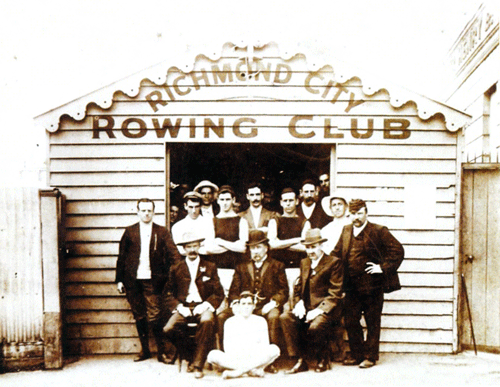
Boathouse, skittle alley at the Sir Henry Barkly Hotel, Richmond
Although RRC has been in its current boathouse for 40 years, in its early years the club was not so settled, moving between four boathouses in its first 50 years.
Richmond has owned its own boathouse, rented from and shared with boat builders, and more recently shared with Monash University and now Methodist Ladies College [MLC] girls' school.
From the start, Richmond had its own fleet and boathouse, contrary to the standard practice at the time of renting boats and space from a boat builder - a practice that minimised costs should a club fold [and many did]. Richmond built a boathouse at the rear of the Sir Henry Barkly hotel, located& close to the Richmond Punt. While this location was somewhat removed from the Melbourne-based clubs, it provided RRC crews with the advantage of training upstream, away from prying eyes, resulting in surprise wins at some early regattas.
It appears that a move to establish a Melbourne city branch sometime after 1871 was unsuccessful. By 1900, Richmond was heavily in debt and the club shed and contents were seized by a creditor, a boat builder. In 1903 club activity re-commenced using the skittle alley at the Sir Henry Barkly Hotel, Punt Road, Richmond. The wonderful photo [left] of the gentlemen of Richmond outside this shed shows that it would have been quite basic accommodation.
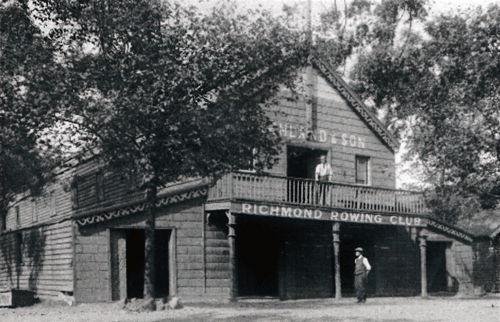
Greenlands Boathouse C1916
In around 1916, Richmond moved to much more substantial accommodation at the Greenland Boat Shed [a boat builder] on the site now occupied by Melbourne Grammar School Boat House near Princes Bridge. In 1919 or 1920, Richmond moved again to Edwards Boat Shed [another boat builder] on Richmond's present site, presumably to accommodate the needs of the growing club.
Fire
Late in 1926, misfortune struck. As reported in the Portland Guardian [21st October 1926]:
"A tremendous fire swept the Yarra banks just before midnight last night. The Richmond Rowing Club was burnt out, and four other clubs suffered heavy losses. Large crowds assembled along the banks, coming in cars from all parts of the city. Henley will not be postponed on Saturday, but the program must be altered owing to the losses sustained. The boat sheds were under notice for removal after Henley at the instance of the rowing clubs. Flames hundreds of feet high lit up the city. The boats lost are estimated to be worth £2,000."
Richmond showed its strength of club spirit as it rapidly moved to recover from the fire. The club had lost fifteen boats and all club records and photographs. Insurance provided £760 towards the £825 loss and the other Yarra Clubs provided fleet and boathouses from which to train.
The committee moved to immediately replace the fleet that had been lost in the fire. By July 1927, Richmond had already purchased a practice eight, practice pair and a clinker racing four. The committee had also ordered another six boats at a total cost of £443. Evidently the strong financial position of the club at this time helped the club's recovery from this catastrophic event.
A new boathouse
The club took possession of a new and up-to-date boathouse on 1st January 1928 Richmond contributed £830 towards the total cost of £3,275. The official opening of the new club house by the Lord Mayor, Sir Stephen Morrell, on 23rd January 1928 must have been quite an event. It was reported to be one of the largest gatherings for a club event on the Yarra at the time.
The top floor was still occupied by a boat builder, WH Jerram, although this time the boat builder was renting from the rowing club, not vice versa. Fire struck again, gutting the top floor on Easter Sunday, 1930. Richmond moved fast and restored the building to its original condition by 30th June 1930.
The committee hoped that Jerram would relinquish the top floor after the fire, as the club was bursting out of its accommodation. Richmond had facilities for 100 members, but that was proving inadequate.
A proposal to extend westwards had been rejected and the committee contemplated a limit on club membership. Eventually Richmond took occupation of the top floor, using it for training and social events and the ground floor as boat storage, like the rowing club boathouses today.
Melbourne City Council had funded most of the building costs for the boathouse, but in the 1950s responsibilities were about to change. In 1956 the Melbourne City Council increased the rent by 500% and made the club responsible for maintenance. To add insult to injury, the club was informed that it must paint the outside and attend to renovations inside the boathouse before the Olympic Games visitors arrived!
Fire - again!
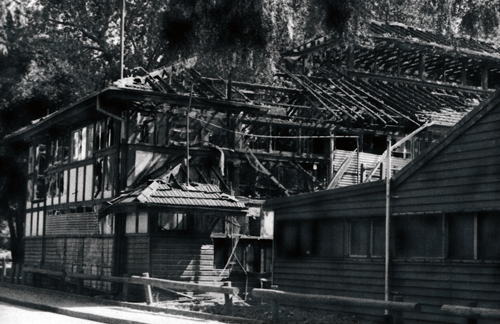
Boathouse destroyed by fire, 1970
Fire struck again in 1970. This time Richmond lost all boats, oars and fittings and over half the boathouse was destroyed. Thankfully, Melbourne Church of England Grammar School stepped into the breach, allowing Richmond full access to their boathouse and equipment.
This time rebuilding was not easy as Richmond's financial position was not strong enough to suffer such a loss.
Plans for the new 'Richmond Rowing Club Peace Memorial' had been completed by the City Architect in 1971 but Richmond lacked the funds to commence building. A concerted fundraising drive raised $3,906 over three years with nearly all members making donations.
Building tenders came in 'too high' at $62,000, $15,000 more than the cash Richmond had available. It had become lean times for training, racing and membership while Richmond had no place to call home and a new solution was required. A group of members, including Ron March, Bob Juggins and Don Dudgeon, formed the Richmond Rowing Club Co-operative Limited that provided a substantial loan to the club. Richmond was committed to making loan repayments of $161 per month but it now had a new boathouse.
According to the Assistant Treasurer at the time, Rod Hendley, Richmond did not miss a single monthly payment and 'robbed Peter to pay Paul' to do it. Richmond was in a rebuilding phase after the three years of disruption - these must have been stressful times. The final repayment was made in September 1980 and the annual report for 1980-81 states: We are indebted to the directors, shareholders and particularly the secretary of the co-operative for providing the means of financing this project. These people not only financed a new building, they ensured the future of the Richmond Rowing Club.
The current boathouse was opened on 23rd June 1973 by Cr Alan D Whalley JP, the Lord Mayor of Melbourne. The day is reported to have been a 'tremendous success with over 400 members, wives, friends and visitors attending.
In 1974, improvements were made including installing the parquetry flooring that still exists in the hall today and installing oar racks. Sliding boat racks, designed by Don Dudgeon, and an innovation in rowing clubs, had already been installed. In 1981 members constructed a bar upstairs. This became a focal point for the social life of the club - what could be better than a beer with mates after a training row?
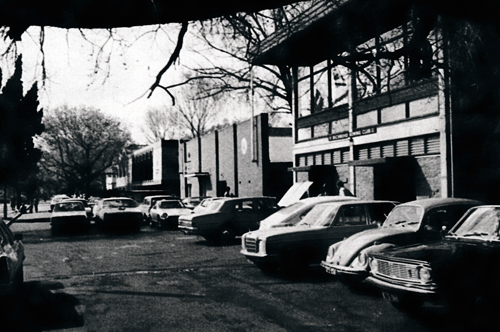
Boathouse Drive, 1977
Renovation
By the late 1980s, the introduction of women members and the expanding MLC rowing program were placing pressure on the boathouse facilities. In 1990 discussions commenced with MLC to redevelop the rowing club, including the possibility of extending the premises. However, plans to extend were rejected by the City Council and the focus shifted to renovating the existing boathouse.
It took a decade for the renovation to be realised, providing vastly improved changerooms and refurbishing the hall. Once again, Richmond members dug deep to support the club. About 30 members donated over $12,000 towards the renovation. No new equipment was purchased in the three years leading up to the renovation. Richmond contributed $57,000 and MLC contributed $221,165. In exchange a Licence Agreement was put in place with MLC to rent one of the bays and use the boathouse for their rowing program for the next 10 years.
The renovated boathouse was opened on 21 January 2001 by Pat McNamara, [President, Rowing Australia] at a well-attended event.
Extension
The renovated boathouse gave a boost to club activity once again. But both MLC and Richmond did not give up hope of extending the boathouse. It took another four years and the creation of the Boathouse Drive Precinct Plan before the City Council approved Richmond's plans to extend in 2004.
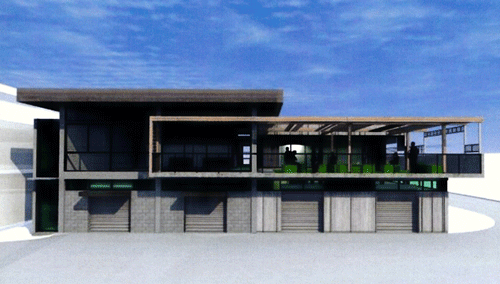
Artist's impression of redevelopment, 2014
Now funding became the hurdle and MLC again came to the party if another 21 year lease could be obtained. It took another six years for City Council to open discussions on leases and a further three years to complete negotiations. In late 2012, City Council agreed to the lease and it was fully executed at the end of 2013. Such is the pace of bureaucracy!
Works on the extension commenced in February 2014 after City Council and the State government agreed to the sublease between Richmond and MLC. Building works will be completed in August 2014.
Don Dudgeon
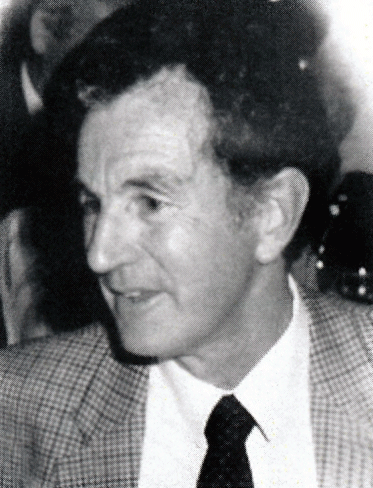
Don Dudgeon - Born 1929: died 2010
Don joined the club as a 17 year old in 1946 and became an officer of the club in 1951. He gave more than 45 years of membership and service to the club.
Don was an outstanding sculler. In the 1950s, he took out the Victorian Open Sculling Championship title over 2 1/4 miles five times and the 2000 metres title four times. He also won the Henley Silver Sculls twice, In 1957, he won the 5 mile Best Boat Marathon and he represented Victoria in the Australian Amateur Sculling Championship.
In later years Don competed in veteran rowing at all levels. he represented RRC at the FISA Veterans Rowing Championships in Toronto, Canada, and the inaugural World Masters Games. Don won gold medals in E Division Double and Quad Sculls, as well as silver and bronze medals.
Don gave countless hours to on and off water activities, coaching beginners and training crews over the years. Following the disastrous fire that destroyed the clubhouse in 1970, Don was instrumental, with Bob Juggins, in establishing the financial structures that proved essential in allowing the club to survive and remain at its present site. Don also manufactured and designed the first sliding boat racks for a Melbourne based rowing club and, with a dedicated team of helpers, installed them at RRC in the 1970s.
Don guided the club through years of rebuilding and held various committee positions: Vice-President (5 years), Executive Vice-President (3 years),
The Dennis Family
Three generations of Richmond Rowing Club members
Alfred Dennis (1861-1933) joined the club in the late 1880s and stroked a wining Maiden 4 at the Melbourne Regatta in 1892. The following year was 2 in the Maiden 8. He continued his association with Richmond and was a successful coach in the early 1900s.
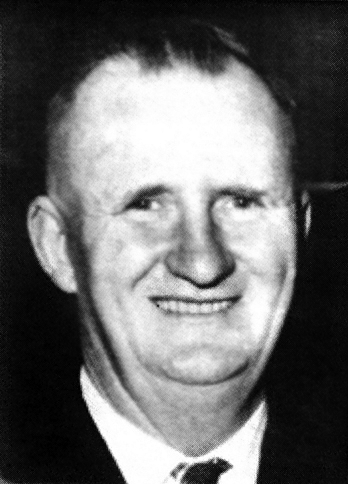
Walter Dennis
Walter Dennis (1905-1975) rowed with success in the 1920s and 30s reaching Senior standard and being selected for the Interstate race but was injured in a car accident. He coached both before and after war service and had great success in the period from 1956 to 1970 with both club crews and University High (a school that ran a rowing program through Richmond). He held several positions on the committee including President during the rebuilding after the fire. At the time of his death, he was President of the Amateur Sculling Association.
Ray Dennis (1939- ) rowed in the 1950s winning races in all classes of boat at both Maiden and Junior level. He coached several novice crews in the late 1960s with success, rowed socially for forty years with Eric Britton and held several committee positions. Ray coached at the masters level and enjoyed the competition and camaraderie as much as in his youth.
Dennis family stories
Regattas were very social times especially the Christmas treble (Nagambie, Yarrawonga and Rutherglen) and also the Easter double, at Sale and Bairnsdale. On these occasions there was often three generations of family there encouraging the club's crews. We ate picnic style at a communal table with everyone sharing food and generally causing mayhem.
Wally was fixated on maintaining good technique especially when tiring near the end of a race, and his concentration on the crew coming down the stone wall, led to him not concentrating on the end of the Henley staging and it was to the crews delight to see Wally and his bike airborne before hitting the water.
One day Wally had a novice pair he coached racing at Preston regatta. The crew was expected to win comfortably. When they lost by a foot, Wally headed for the staging with steam pouring from his ears only to find the bow man's seat had dislodged at the start and his rear end was a mess as he had used the slide anyway. Wally soon calmed down.

